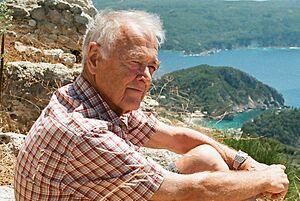Oliver Wrong facts for kids
Professor Oliver Murray Wrong (born 7 February 1925, died 24 February 2012) was a very important doctor who specialized in kidneys. He was one of the people who helped start the study of kidneys as a special field in the United Kingdom. Dr. Wrong was known for his careful observations and clever ideas about how the human kidney works at a tiny, molecular level. Even after he officially retired, he kept working on these important discoveries. He was a kind doctor who connected well with his patients, which he felt was key to his research. He was also part of a group of doctors who helped create the UK's National Health Service after World War II.
Contents
Early Life and Family
Oliver Wrong was born in Magdalen College, Oxford. He was one of six children. His father, Edward Murray Wrong, was a history lecturer. His grandfather, George MacKinnon Wrong, was also a famous historian. Oliver's mother, Rosalind Smith, was a historian too.
When Oliver's father died young, and during the time of the Great Depression, the children were split up. Oliver and two of his sisters went to Toronto, Canada. They were raised by their grandfather, George MacKinnon Wrong.
Education and Early Career
Oliver Wrong studied medicine at Magdalen College, Oxford. He finished his medical training at the Radcliffe Hospital in Oxford. For his 'National Service' (like military service), he worked with the Royal Army Medical Corps in Singapore and Malaysia. He would later return to this area for some of his research.
After working in Toronto and at Massachusetts General Hospital, he became a medical tutor in Manchester. A doctor named Alexander Leaf greatly influenced him. They worked together on an important paper about how a hormone called Anti-Diuretic Hormone affects the kidneys.
Research and Discoveries
In 1959, while in Manchester, Dr. Wrong wrote a very important paper. He worked with Dr. H.E.F. Davies. This paper explained how the human kidney gets rid of acid in urine. His careful study of this process and how kidney disease affects it became a classic paper that many other scientists referred to.
Later, Dr. Wrong became a professor at Dundee University. In 1972, he returned to University College Hospital (UCH) in London as a Professor of Medicine.
Understanding the Kidney
At UCH, Dr. Wrong made big discoveries about how the human kidney works. He was also interested in how the large intestine helps balance salt and water in the body.
However, he is best known for his work on kidneys. This work started with a special test he developed with Dr. Davies. This test helped doctors understand how well kidneys could get rid of acid.
Kidney Acidosis Research
Dr. Wrong and Dr. Davies studied how the kidney gets rid of acid. They found that in a group of diseases called 'Renal Tubular Acidosis' (RTA), the kidney still produced a good amount of ammonium. This was different from other types of chronic kidney failure.
They also found a group of patients with 'incomplete' RTA. Thanks to Dr. Wrong's work, we now know that there are different types of RTA. For example, 'Type 1 RTA' affects one part of the kidney, and 'Type 2 RTA' affects another.
Hereditary Kidney Diseases
Dr. Wrong and his team also helped identify several types of RTA that are passed down through families. This work was very important for advances in molecular genetics in this field.
They showed that 'Type 1 RTA' could be inherited in two ways:
- Dominant: Where only one parent needs to pass on the gene.
- Recessive: Where both parents need to pass on the gene.
They also found that different gene changes caused different forms of recessive RTA. These discoveries helped us understand the tiny genetic changes that lead to these kidney problems.
Nephrocalcinosis
Dr. Wrong was a world expert on a condition called Nephrocalcinosis. This is when too much calcium builds up in the kidneys. He wrote a chapter about it in a major kidney textbook, sharing what he learned over his long career.
Dent's Disease Discovery
Dr. Wrong made another big discovery. He noticed that some patients at UCH had a hereditary condition. It was similar to something reported earlier by his predecessor, Professor Charles Dent.
Professor Dent had described two patients with a condition called 'Hypercalcuric Rickets'. Dr. Wrong realized this was a new hereditary disease. He and his team called it a form of 'renal Fanconi Syndrome'.
Later, scientists found that changes in a gene called CLCN5 caused many of these disorders. This included one of the original patients described by Professor Dent. Even though Dr. Wrong had already retired, his insights led to this important discovery. This condition is now known as Dent's disease. Some people even suggest it should be called 'Dent-Wrong' disease because of his key role.
Dr. Wrong's work also led to the discovery of a second type of Dent's Disease, called 'Dent Disease Type 2'. This type is caused by changes in a different gene called OCRL1. So, his discoveries helped identify two new hereditary kidney diseases!
Final Work
Even when he was unwell later in life, Professor Wrong continued to work on his final paper. This paper described a type of RTA found in Southeast Asia. He suggested that the gene changes causing this condition might also protect against malaria, a serious disease in that region.
Professor Wrong's papers are kept at the Wellcome Trust Library in London.
Family Life
Oliver Wrong married Marilda Musacchio in 1956. She was a primary school teacher from Val d'Aosta, Italy. They had three daughters, and one of them is the well-known author and journalist Michela Wrong.
Images for kids
 | James B. Knighten |
 | Azellia White |
 | Willa Brown |



